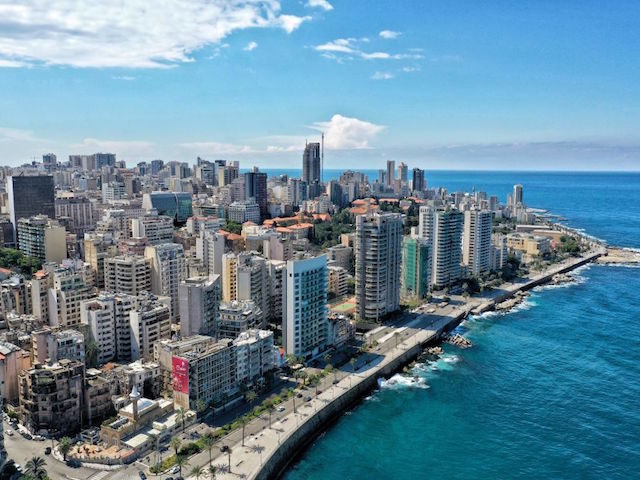Lebanese officials imposed an extremely strict nationwide lockdown Thursday as coronavirus cases spiked and the prospects for widespread vaccinations grew dim.
The tight restrictions signal the abandonment of earlier plans for a more controlled lockdown with exceptions for certain industries.
As of Thursday, everyone in Lebanon was placed under house arrest and required to request one-hour “emergency permits” to leave their homes, even for food or medical care. The BBC reported that land and sea borders will be closed, while airline passengers flying into Lebanon will be required to “quarantine in a hotel for seven days and undergo two coronavirus tests.”
Naharnet Newsdesk reported that extreme measures were called for after hospitals were overwhelmed and the dysfunctional Lebanese government tottered on the brink of total collapse, having never reconstituted itself after the devastating August explosion at the Port of Beirut:
Authorities came under pressure to take a tougher approach after the country’s hospitals ran out of beds with daily infections reaching an all-time high of 5,440 cases last week in the country of nearly 6 million people.
Even before the coronavirus, Lebanon was going through an unprecedented economic and financial crisis that has seen its national currency and bank sector collapse and locked depositors out of the savings. Hospitals, long considered among the best in the Middle East, struggled to pay staff, keep equipment running and secure necessary medical supplies as dollars grew scarce.
Amid the surge, many hospitals have now reached maximum capacity for coronavirus patients. Some have halted elective surgeries as they run out of beds, oxygen tanks and ventilators.
Naharnet described the 11-day state of emergency as the “strictest since the start of the pandemic,” with police deployed to checkpoints across Lebanon to enforce the lockdown, and even supermarkets ordered to shut down except for food deliveries.
The Associated Press (AP) saw Lebanese officials faced with a stark choice between “containing a spiraling virus outbreak and resuscitating a dying economy in a country that has been in steady financial and economic meltdown over the past year.”
The AP painted a grim picture of Lebanon’s medical and political crisis:
While Lebanon still somehow managed to keep cases to an average of fewer than 100 per day until August, it now leads the Arab world in number of cases per million people. Today, the number of daily COVID-19 [Chinese coronavirus] deaths is more than 13 times what it was in July. On Jan. 9, over 5,400 infections were reported, a record for the small country.
On Thursday, Lebanon registered a new daily record of 41 deaths, bringing the overall number of recorded cases to nearly 237,200 and 1,781 deaths, according to the Health Ministry.
While its neighbors begin vaccinating their populations — including Israel, whose campaign promises to be among the world’s speediest — Lebanon has yet to secure a first batch of shots. Once a leader in the health sector among Middle Eastern countries, Lebanon has been stymied in its effort to get vaccines by repeated bureaucratic delays partly due to the fact that it has a caretaker government.
Lebanese interviewed by foreign news agencies expressed deep frustration with their government and its inability to enact reforms, or even manage daily affairs of state, after the Beirut port explosion. Some criticized the government for allowing travel and public celebrations during the holiday season because Lebanon was desperate for foreign tourism and currency. They also denounced the government for taking so long to secure any of the new coronavirus vaccines — not until Friday did the legislature take steps to import Pfizer’s vaccine, and at best it will only be able to procure enough vaccine to cover about 35 percent of the population.
The Jerusalem Post on Friday suggested Lebanon’s inability to purchase or distribute vaccines means it could “become the first country to reach herd immunity,” in the most unpleasant manner imaginable.
As the article pointed out, vaccination would cost the majority of Lebanese more than twice the amount of money they earn in a month. Even if the government secures a vaccine supply and provides enough subsidies for the population to access it, Heiko Wimmen of the International Crisis Group warned that Lebanon’s ramshackle power grid does not provide enough reliable electricity for hospitals to keep the drugs properly refrigerated.
Piling injury atop injury, the Jerusalem Post noted that among the many resources destroyed the titanic Port of Beirut explosion were “at least 17 containers holding essential medical supplies and a shipment of personal protective equipment,” and Lebanese doctors were among the first to give up on the country and flee after the blast.
Wimmen was among the outside observers who doubted the ultra-strict lockdown imposed on Thursday would be effective since it will likely destroy what remains of the Lebanese economy and push much of the population into extreme poverty.
“Almost half of the population can’t afford to buy sufficient food to last them through the supermarket closures. We fear they will face hunger as it is uncertain whether stores have the capacity to deliver food to people’s homes,” Jennifer Moorehead of Save the Children told the BBC.
“The healthcare system is weak, officials are useless and many people don’t seem to care. The situation is miserable and I’m afraid of what’s to come, but I’m honestly at the point now where I just say, ‘whatever happens, happens,’” a frustrated intensive-care unit doctor told Al Jazeera News last week, as the rising tide of coronavirus cases threatened to overwhelm Lebanese hospitals.
The ICU doctor thought Lebanon would end up making horrible “triage” choices like Italy did at the height of its pandemic, when doctors had to withhold treatment from elderly patients so they could focus their efforts on younger people with a better chance of survival.

COMMENTS
Please let us know if you're having issues with commenting.